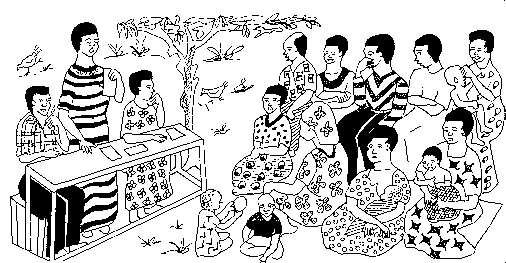Tweet
Translations:
Català
Deutsch
English
Español
Filipino/Tagalog
Français
Ελληνικά / Elliniká
हिन्दी / hindī
Italiano
Português
Română
Српски / Srpski
Türkçe
اردو / Urdu
Other formats:
Other Pages:
Modules
Site Map
Key Words
Contact
Utility Documents
Useful Links
Contents:
Contents:
Contents:
WHY WRITE REPORTS?
by Phil Bartle, PhD
A Guide
PART A: The "Why" of Report Writing:
Have you ever felt annoyed or discouraged because you must write a report? Is writing just a boring and tedious duty, that seems you have to do because of some bureaucratic regulation?
Would you rather be doing the "real" work of organizing meetings, leading community members to make their own decisions, training people and watching them learn new skills, or guiding a community through constructing its own project?
Well, here is some good news. Writing reports can be challenging, interesting and even fun. And report writing is not something separate from the "real" work. It is a necessary and integral part of the work; it is just as "real" as the rest.
Report writing is useful and valuable (especially when it is done right). Read on; this document tells you all about it.
Some Discussions With Mobilizers:
Recently, I asked some mobilizers (1) in a Uganda community management training session, "Why should reports be written?"
- These are some of their answers:
- because we have to;
- to enable us to keep records;
- to inform all interested Ugandans;
- to tell about failures and successes;
- for ourselves, to keep on knowing what we are doing;
- to communicate to donors and funders (how the project progresses);
- so donors could be encouraged knowing what happened with their donations;
- to let other people know about the developments of a project;
- so other people can be encouraged to do their own projects;
- so community members would be encouraged and informed;
- so other people can learn what we did;
- to help researchers to do their work;
- to determine further actions;
- to use for evaluation; and
- for the Government.
Footnote (1): I had been invited by some mobilizers and community project implementors to come to the field to give them some tips on writing reports. The community management contract with the CBO includes clauses that require the CBO to write progress reports on their community projects, or else subsequent phases of their funding would not be forthcoming. They wanted to ensure that the reports they had to write would be "according to the standard" required by community management, to ensure payment of subsequent instalments. My task, as I saw it, was to demonstrate that the clauses requiring CBOs to write progress reports were there for good reason (empowering the communities); not merely a mindless bureaucratic requirement. At this point I must express my thanks to all the community management mobilizers, Community Development Assistants (CDAs) and CBO members who contributed to these workshops and therefore to the content of these guidelines. (All errors are my own).
As the discussion continued, and the participants each added reasons for reports, we all became aware that reports have many useful purposes and (so long as they are read) play an integral part in success in community work.
- Therefore, we concluded:
- We should write reports;
- Reports should be read; and
- Action should result from each report.
Monitoring and Report Writing:
In any workable project design, there are specific steps (ie define problem, generate goal, specify objectives, identify resources, choose a strategy, implement, monitor, redesign as needed), and monitoring is a necessary part.
Just as we can not ride a bicycle unless we can see where the bicycle is going, so also we cannot stay on track with a community project unless we "see" where the project is going. That "seeing" is monitoring the project, and communicating it to the contributors and decision makers.
The monitoring of progress of any project or activity must be therefore be integrated with its planning and implementation. It is therefore included in community management training.
Monitoring should be done by the community members themselves, by all other actors represented by the signatories of the community contract, and by or on behalf of the several donors, by all who contributed and participated in the community project.
How to monitor, and how to institutionalize monitoring and assessment, is part of the community management training. Trainers as facilitators must draw out of community members (eg through brainstorming sessions) what should be monitored.
If any one factor can contribute to early paralysis and cancelling of community activities, it is the suspicion of misuse of resources; "thus endeth sustainability."
Project Progress Reports:
A project is not complete unless it is monitored. Monitoring must be recorded and communicated. That communication is a report.
A project progress report is a record and communication of the results of project activities: the degree to which objectives are or have been reached; reasons why: assessment of factors; and recommendations.
A progress report is a necessary part of a project.
Field Worker's Routine Report:
A worker, voluntary or paid, is given a job in order to achieve some results. Those desired results should be stated on the job description of the worker. How do we know if that worker achieved the desired results (or to what degree)?
A worker's routine report shows the degree to which activities have resulted in desired results; reasons why: assessment of factors; and recommendations.
In both cases, a report should compare what was wanted with what was achieved; analyse the reasons; and make recommendations.
Good reports are vital !
––»«––
Reporting to the Community:
 |